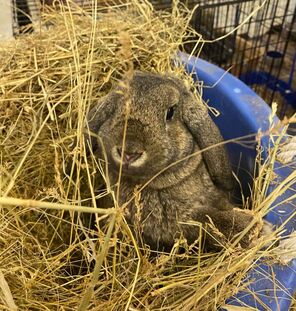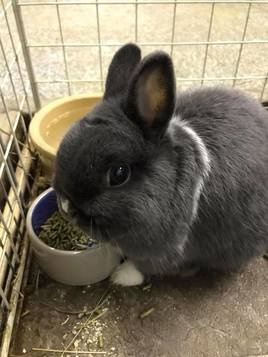Caring for Your Rabbit - Food

Your bunny has simple dietary requirements: unlimited timothy hay, a small portion of timothy pellets, and some leafy vegetables each day. Of course, unlimited, fresh water in a bowl should always be provided. This diet is simple yet very healthy for your bunny. You can give them a few treats each day, but only very small amounts.
*Note: On this page, we do promote some of our top picks for what we feel (based on our own pet rabbit rescue care experience) are good or high-quality pet rabbit products available for purchase on Amazon. The shelter does earn a small commission from purchases made from these links, as an added way to help us fundraise.
*Note: On this page, we do promote some of our top picks for what we feel (based on our own pet rabbit rescue care experience) are good or high-quality pet rabbit products available for purchase on Amazon. The shelter does earn a small commission from purchases made from these links, as an added way to help us fundraise.
HayFresh timothy hay is the most important part of a rabbit’s diet. Its high fiber content helps keep their gut moving well for proper digestion, and the long fibers help keep the intestinal tract clear of obstructions. Chewing the hay fibers also helps grind your rabbits' teeth (which grow continuously) and keep them healthy. Your rabbit should have unlimited amounts of timothy hay. If you see the hay supply running low, fill it up again. Rabbits will graze on it throughout the day.
Orchard grass and Botanical grass varieties from Oxbow, Small Pet Select, Standlee, or other trusted U.S. brands are tasty options they will enjoy on the side, but Timothy hay is the healthiest one for rabbits and the highest in fiber and nutrition. Wild rabbits eat grass, which in its dry form is simply hay. In addition to the invaluable fiber it contains, hay also provides vitamins, minerals, and protein in a form the rabbit's digestive tract can handle. Young rabbits (less than six months of age) can be fed alfalfa hay rather than timothy hay. Alfalfa hay is higher in protein and calcium and lower in fiber than timothy hay. This is acceptable, even desirable, in young, rapidly developing rabbits. But alfalfa hay is unhealthy for adult rabbits. Rabbits between the ages of six months and a year should be transitioned to timothy hay. Rabbits will prefer alfalfa hay, so during the transition you may need to mix the two types of hay. In some cases, a rabbit may rebel and not eat the timothy hay. However, if the pellets and vegetables are being given in the appropriate (limited) amounts, they’ll eventually become hungry and eat the timothy hay. |
What to AvoidMost treats sold in pet stores are unhealthy for your rabbit, even though your rabbit might readily eat them. Indeed, they are designed so that your rabbit eats them and you purchase more, not for the nutritional needs of your rabbit. They frequently contain food that isn’t good for his digestive system or his overall heath. Stick to hay, timothy pellets, and certain vegetables we recommend here, and they’ll have a good diet.
Specific items to AVOID, even as treats: Pellets that contain seeds, nuts or cereal; Processed cereal, kibble, mueslix; Oat, Corn; Grains; Crackers; Candy (including yogurt drops). Also, rabbits DO NOT need vitamin supplements. A proper diet of unlimited hay, limited pellets and vegetables contains all the vitamins your rabbit will require. Toxic PlantsYou can find a list of plants that are toxic to rabbits on the House Rabbit Society's web site at: https://rabbit.org/poisonous-plants/ |
Online Sources of Hay
|
Good quality hay can be purchased in stores. However, since it is the staple of your bunnies diet, you can consider purchasing it in large quantities from online sources. Hay is just dried grass, so it can be stored for relatively long periods.
The following sources have excellent quality hay with little stems, so there is little waste. Try the second cut timothy hay! Many of our volunteers use these top brands and love them (and so do their pet bunnies!):
|
Pellets

There are two types of rabbit pellets, those made from timothy hay and those made from alfalfa hay. Adult rabbits should be fed only timothy pellets. Here at Midwest Rabbit Rescue, we only use and recommend the Oxbow Essentials Rabbit Food (the red bag). Do not buy the various types that include dried fruits and seeds. They might like them, especially the sugary items, but they are linked to causing obesity, dental disease, gastrointestinal issues, and nutritional deficiencies.
Your rabbit should be given limited amounts of timothy pellets each day. Use the following as a guide
The determining factor in determining the amount of pellets to feed is that you use pellets to control your rabbit’s weight. If your bunny is too heavy, cut back on the pellets. (Assuming you aren't overfeeding treats.) You will need to determine the correct amount of pellets for your bunny, which depends on his/her metabolism, amount of exercise, and the makeup of the rest of their diet. But remember, they don’t need a lot of pellets - you want your rabbit to be eating mostly hay. If your rabbits' weight is good, you’re probably feeding the correct amount.
As with hay, the pellet diet is different for young rabbits. Rabbits between ages seven weeks and six months can have unlimited amounts of Oxbow Essentials Young Rabbit Food. Rabbits between ages six months and a year should be transitioned off alfalfa pellets and onto timothy pellets, in the amounts described above. Rabbits prefer alfalfa pellets, so your bunny may not at first eat the timothy pellets. During those ages you can feed a mix of alfalfa and timothy to aid the transition.
Your rabbit should be given limited amounts of timothy pellets each day. Use the following as a guide
- Under 5 pounds: 1/8 - 1/4 cup per day
- 5 - 7 pounds: 1/4 cup per day
- 8 - 10 pounds: 1/2 cup per day
- 11 or more pounds: 1/2 - 3/4 cup per day
The determining factor in determining the amount of pellets to feed is that you use pellets to control your rabbit’s weight. If your bunny is too heavy, cut back on the pellets. (Assuming you aren't overfeeding treats.) You will need to determine the correct amount of pellets for your bunny, which depends on his/her metabolism, amount of exercise, and the makeup of the rest of their diet. But remember, they don’t need a lot of pellets - you want your rabbit to be eating mostly hay. If your rabbits' weight is good, you’re probably feeding the correct amount.
As with hay, the pellet diet is different for young rabbits. Rabbits between ages seven weeks and six months can have unlimited amounts of Oxbow Essentials Young Rabbit Food. Rabbits between ages six months and a year should be transitioned off alfalfa pellets and onto timothy pellets, in the amounts described above. Rabbits prefer alfalfa pellets, so your bunny may not at first eat the timothy pellets. During those ages you can feed a mix of alfalfa and timothy to aid the transition.
Vegetables
Your rabbit’s diet should include fresh vegetables each day. Most rabbits will do well with about 1/2 to 1 cup per day. Some rabbits will have an adverse reaction to certain vegetables, resulting in diarrhea. You'll need to introduce new vegetables slowly, one at a time. That way, if there is a reaction, you’ll know which one is the cause.
Give a variety of vegetables from the list below. A variety is necessary in order to get all the various nutrients. Vegetables are an essential source of vitamins and serve as an extra source of hydration.
Safe nutritious vegetables - Cilantro, Dandelion greens and flowers (no pesticides), Dill, Fennel, Mint, Watercress, Basil, Parsley (limited amounts), Thyme, Oregano, Arugula, Green leaf lettuce, Red leaf lettuce, Endive, Escarole, Romaine lettuce, and Artisan blend lettuce (these blends include Tango, Oak, Red Gem, and Green Gem).
*Wash all fresh veggies well in cold water before giving them to your bunny, and do not give any wilting or rotten leaves, these can hurt their digestion*
Never feed - Alfalfa, Spinach, Kale, Swiss Chard, Beet greens (tops), Bok choy, Broccoli, Cabbage, Carrots, Cauliflower, Celery, Collard greens, Green Pepper, Mustard greens, Pea pods, Radish tops, All fruit.
These items are either listed because they're excessively high in oxalic acid, calcium, sugar, or are simply known to cause digestive upset. While other popular rabbit care websites may recommend items from this list, in our experience these vegetables can lead to serious issues down the line.
TOXIC - Beans, Rhubarb, Garlic, Onions, Iceberg lettuce, Avocado, Corn
Don’t give your bunny leftover or stale vegetables - if you wouldn’t eat it, don’t give it to your pet rabbit.
Give a variety of vegetables from the list below. A variety is necessary in order to get all the various nutrients. Vegetables are an essential source of vitamins and serve as an extra source of hydration.
Safe nutritious vegetables - Cilantro, Dandelion greens and flowers (no pesticides), Dill, Fennel, Mint, Watercress, Basil, Parsley (limited amounts), Thyme, Oregano, Arugula, Green leaf lettuce, Red leaf lettuce, Endive, Escarole, Romaine lettuce, and Artisan blend lettuce (these blends include Tango, Oak, Red Gem, and Green Gem).
*Wash all fresh veggies well in cold water before giving them to your bunny, and do not give any wilting or rotten leaves, these can hurt their digestion*
Never feed - Alfalfa, Spinach, Kale, Swiss Chard, Beet greens (tops), Bok choy, Broccoli, Cabbage, Carrots, Cauliflower, Celery, Collard greens, Green Pepper, Mustard greens, Pea pods, Radish tops, All fruit.
These items are either listed because they're excessively high in oxalic acid, calcium, sugar, or are simply known to cause digestive upset. While other popular rabbit care websites may recommend items from this list, in our experience these vegetables can lead to serious issues down the line.
TOXIC - Beans, Rhubarb, Garlic, Onions, Iceberg lettuce, Avocado, Corn
Don’t give your bunny leftover or stale vegetables - if you wouldn’t eat it, don’t give it to your pet rabbit.
Water
Your rabbit should have access to fresh, clean water at all times. You want them to stay hydrated! A water bowl is best, as rabbits can drink much more easily from it than they can with a bottle. Get a heavy bottom bowl so they don’t tip it over. Replace the water daily.
Treats
You can give your bunny some healthy treats, but only in very limited quantities. Rabbits have a very big sweet tooth. This makes it fun to give them treats. But too much sugar is detrimental to both their health and maintaining their weight at the proper level. Many rabbits cannot tolerate sweet treats as often as once per day. It’s up to you to limit the number of treats - even though it’s so fun to see them so excited for them!
Make it fun and a time to interact and bond with your bunny by giving treats by hand. A few favorites include the Oxbow brand healthy urinary treats to keep their bladder and overall digestion healthy.
Many rabbits also like timothy hay cubes (not alfalfa hay), which make a good treat. They are compressed hay, so they’re good for him, and they are fun to chew.
Fruits, including dried fruits, should be avoided as they are too high in sugar, and can eventually cause them to develop bladder issues, bladder stones, and even diabetes.
TIPS: Do not give ANY treats containing Vitamin C - rabbits cannot process this mineral and it should never be given as a treat or supplement!
Remember, treats don’t need to be food! Your bunny will be very happy with new toys every so often. Give him different kinds once in a while. Like humans, they are interested in new things.
Make it fun and a time to interact and bond with your bunny by giving treats by hand. A few favorites include the Oxbow brand healthy urinary treats to keep their bladder and overall digestion healthy.
Many rabbits also like timothy hay cubes (not alfalfa hay), which make a good treat. They are compressed hay, so they’re good for him, and they are fun to chew.
Fruits, including dried fruits, should be avoided as they are too high in sugar, and can eventually cause them to develop bladder issues, bladder stones, and even diabetes.
TIPS: Do not give ANY treats containing Vitamin C - rabbits cannot process this mineral and it should never be given as a treat or supplement!
Remember, treats don’t need to be food! Your bunny will be very happy with new toys every so often. Give him different kinds once in a while. Like humans, they are interested in new things.
